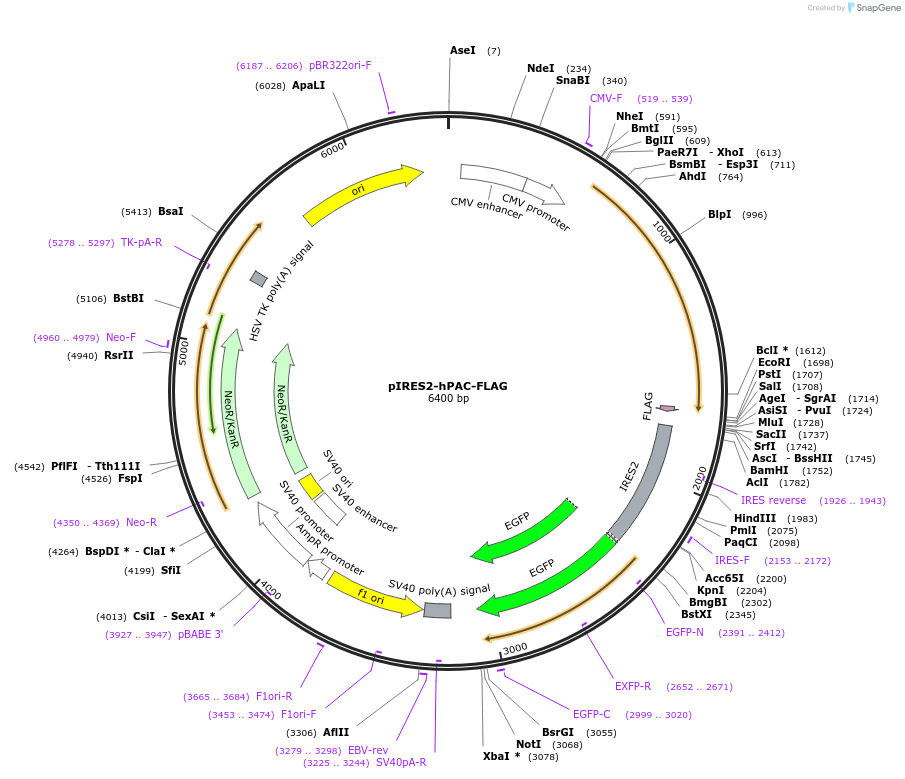pIRES2-hPAC-FLAG
(Plasmid
#129494)
-
PurposeExpresses human TMEM206 tagged at the C-terminus with FLAG
-
Depositing Lab
-
Sequence Information
Ordering
| Item | Catalog # | Description | Quantity | Price (USD) | |
|---|---|---|---|---|---|
| Plasmid | 129494 | Standard format: Plasmid sent in bacteria as agar stab | 1 | $89 | |
Backbone
-
Vector backbonepIRES2-EGFP
-
Backbone manufacturerClontech
- Backbone size w/o insert (bp) 5300
- Total vector size (bp) 6377
-
Modifications to backboneInsert hPAC C-FLAG
-
Vector typeMammalian Expression
-
Selectable markersNeomycin (select with G418)
Growth in Bacteria
-
Bacterial Resistance(s)Kanamycin, 50 μg/mL
-
Growth Temperature37°C
-
Growth Strain(s)DH5alpha
-
Copy numberUnknown
Gene/Insert
-
Gene/Insert namehuman PAC tagged with FLAG tag at the C-terminal end
-
Alt nameC-terminus FLAG-tagged hPAC
-
Alt namehPAC C-FLAG
-
Alt nameTMEM206
-
SpeciesH. sapiens (human)
-
Insert Size (bp)1077
-
GenBank IDNP_060722
-
Entrez GenePACC1 (a.k.a. C1orf75, PAC, TMEM206)
- Promoter CMV
-
Tag
/ Fusion Protein
- FLAG (C terminal on insert)
Cloning Information
- Cloning method Restriction Enzyme
- 5′ cloning site XhoI (unknown if destroyed)
- 3′ cloning site EcoRI (unknown if destroyed)
- 5′ sequencing primer CMV - F
- 3′ sequencing primer IRES - Rev
- (Common Sequencing Primers)
Terms and Licenses
-
Academic/Nonprofit Terms
-
Industry Terms
- Not Available to Industry
Trademarks:
- Zeocin® is an InvivoGen trademark.
These plasmids were created by your colleagues. Please acknowledge the Principal Investigator, cite the article in which the plasmids were described, and include Addgene in the Materials and Methods of your future publications.
-
For your Materials & Methods section:
pIRES2-hPAC-FLAG was a gift from Zhaozhu Qiu (Addgene plasmid # 129494 ; http://n2t.net/addgene:129494 ; RRID:Addgene_129494) -
For your References section:
PAC, an evolutionarily conserved membrane protein, is a proton-activated chloride channel. Yang J, Chen J, Del Carmen Vitery M, Osei-Owusu J, Chu J, Yu H, Sun S, Qiu Z. Science. 2019 Apr 26;364(6438):395-399. doi: 10.1126/science.aav9739. Epub 2019 Apr 25. 10.1126/science.aav9739 PubMed 31023925



